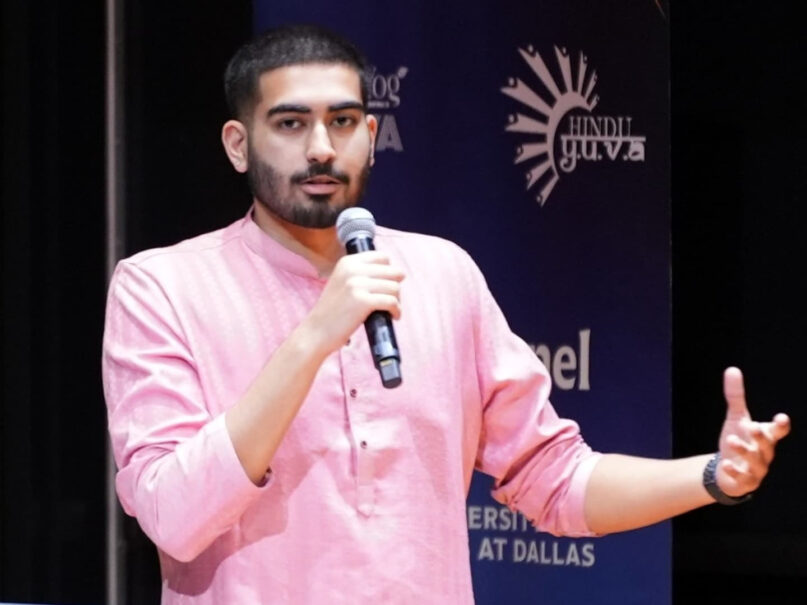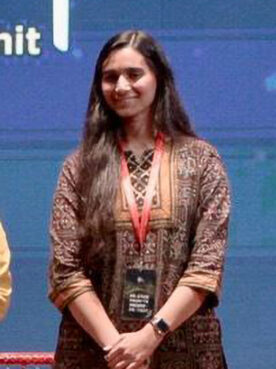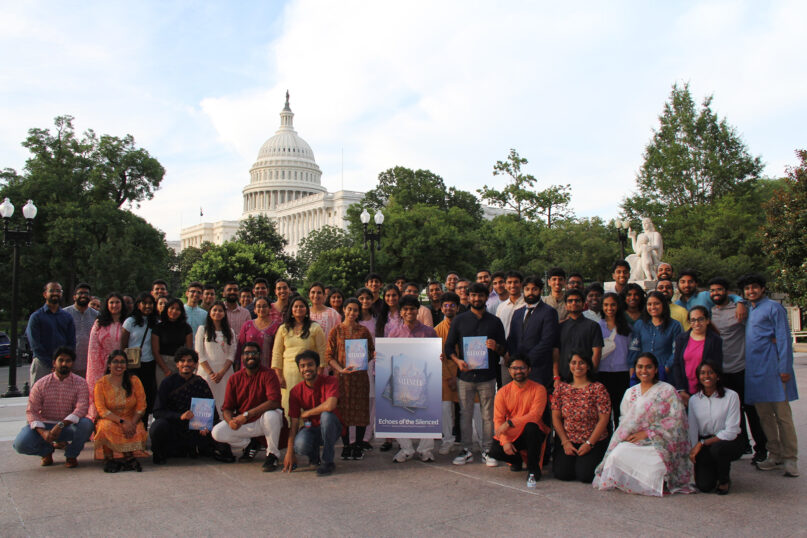
(RNS) — When a group of college-age Hindus created an educational Instagram account about Hinduism in 2020, writing a 150-page history book seemed like a far stretch. But the about-30 young adults behind The American Hindu — a first-of-its-kind publication house created in partnership with Hindu YUVA, which seeks to preserve Hindu culture and empower youth — is now releasing their second publication in two years.
Their new book, “Echoes of the Silenced,” seeks to uncover the long-overlooked history of persecution faced by Hindus worldwide, the authors said. Compiling research and more than 50 interviews with survivors in North America, the book describes over a dozen incidents involving discrimination, exodus and genocide spanning the past century in South and Central Asia. It also emphasizes intergenerational trauma experienced by descendants in the diaspora.
Editor-in-Chief Charu Chaturvedi, an engineering master’s student at Georgia Institute of Technology in Atlanta, and contributor and undergraduate student Pranav Patel, who is studying finance at the University of Texas at Dallas, said these stories from Afghanistan, Pakistan, Kashmir, Bangladesh and beyond should be required reading for young Hindus unaware of their ancestors’ sacrifices. RNS spoke with them about The American Hindu and the book, which had a launch event in Washington, D.C., Friday (June 20) and published June 10. The interview has been edited for length and clarity.
How did you find yourself on the path to becoming a Hindu advocate?
Chaturvedi: I was very much focused on internally doing my own practice of being Hindu — I wasn’t focused as much on sharing that culture or bringing Hindus all together. But when I came to college, I found people that were equally proud to be Hindu and took initiative to share our culture. I had those values instilled in me that I am proud to be Hindu, and I always enjoyed taking part in Hindu activities. (The students) were very interested in Hindu history, and they wanted to really emphasize that there were a lot of sacrifices made in our history. Sacrifices are made to preserve what we’re able to practice on our own today.
Patel: I grew up around of a bunch of Hindu classmates who would (say) things like, ‘I’m not religious, or my family forces me to do pujas.’ It was very important to me to be able to continue to practice my dharma at college with others, but also to provide a platform for students who are away from home to do the same.

Pranav Patel. (Courtesy photo)
What was the idea behind The American Hindu publishing organization?
Chaturvedi: It started initially around 2020 as an educational social media page on Instagram. The purpose was to provide informational content to Hindu American youth on Hindu culture and practices with questions that we may have asked our parents growing up, like, ‘Why do we do a puja to our car when we get a new one?’ Or, ‘Why do we touch the feet of our elders?’ It started with a few working professionals that were previously in Hindu YUVA when they were students, and then we slowly started to grow.
In 2024, we decided to pivot, and it became more of a Hindu YUVA project aimed to provide a multimedia platform for publications for Hindu American youth. The goal was to involve as many Hindu Americans as we can, to let them have a platform to display their talents, their interests, in any form of publication or production that they’d like to. We’ve had two publications now since we became a publication house.
We’re not in the line of writing or journalism. I’m an engineer, but we still want to be able to have our voices heard. I think that’s what’s really powerful about being Hindu American; you do not have to be in politics for your voice to be heard. Our society is set up in a way that everybody has a voice, and I think it’s really important that Hindu Americans know that, acknowledge that and work on it to make sure everybody knows our history and our culture and who we are.
Patel: Unfortunately, every month there’s some news that comes out (about) some kind of disaster that’s occurred to Hindus. What drives me the most is just seeing people like me, my age, the young generation of Hindus born and brought up here, losing touch with their faith. But as someone who’s gotten into it, it’s so beautiful. I don’t see how you wouldn’t want to be a part of it and embrace every single part of it.
There’s such a large young Hindu American population, and I think being able to utilize that is very important. I think we’ve seen in recent times there’s been an upward shift in the amount of people that have created social media accounts reading daily quotes from the Gita. These small efforts make all the difference in the world. If we’re able to really put our foot down, come together as a community and cover all facets of society, I think it’ll be a very, very beautiful thing.
Why now?

Charu Chaturvedi. (Courtesy photo)
Chaturvedi: There are still situations in the world where Hindus are being persecuted. Just so recently, in Kashmir, there was a terror attack against Hindu tourists. When you research, you see it’s history repeating itself. There’s no comprehensive book or publication that really talks about all of it. ‘Echoes of the Silenced’ is the first of its kind with the history of the last 100 years for Hindus. The now-descendants of those people are currently in America, going about their daily lives. They’re at work, they are classmates at school, and nobody really knows the history that they have faced or that their family has faced, and this kind of paying tribute seems to be very necessary at this time.
Patel: We’ve always seen in the past how so many of the problems have been caused by the lack of unity and lack of pride. We come from such a rich heritage that it makes you extremely proud, regardless of whatever good or bad happened. You’re very proud to be able to call yourself a Hindu, or call them your ancestors. I’ve seen the sacrifices they’ve made for things they might not ever get to see happen. And so, it’s always the bottom line of, if they could do it, why can’t I?
What did you learn in writing “Echoes of the Silenced”?
Chaturvedi: I think the No. 1 thing I’ve learned about is the resilience Hindus have had over the many years. We’ve protected our culture for the last thousands of years. Even when everything is torn down and we have to start again from ground zero, still, we’ve rebuilt, and now Hinduism is one of the largest practiced religions around the world and the oldest. I think that resilience, and then learning that there’s so many different communities within the larger Hindu community that have faced persecution or a lot of struggle. We don’t get to hear about it because they just move on, they pick up and they keep going. I think that has been very inspirational, and I also feel like that’s made it even more important to share what has happened.
Patel: It was a very satisfying journey to be able to personally talk to all these people, and have stories come from victims themselves. It leaves a very different impact on you. I think that’s what makes this book so amazing is that the majority of the content is based off of what these victims have shared themselves. Their reactions when they were given the ability to share their stories made all the difference. The book just fosters more empathy, accountability, awareness, and it serves as a call to action but also a historical record. The process itself was tedious, but in the end, it has come out to be very satisfying.

A launch event for the book “Echoes of the Silenced: Stories of Global Hindu Persecution,” in Washington, D.C., Friday, June 20, 2025. (Photo courtesy The American Hindu)
